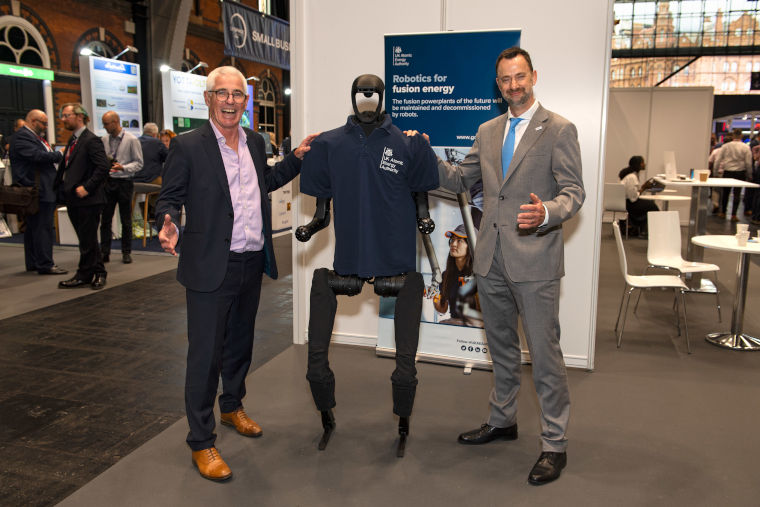UKAEA’s RACE team showcases robotics expertise at UK Space Conference 2025
UKAEA’s RACE (Remote Applications in Challenging Environments) team attended the UK Space Conference.

UKAEA’s RACE (Remote Applications in Challenging Environments) team attended the UK Space Conference, held in Manchester from 16–17 July, joining leaders from across the space sector and wider economy to explore the role of space in driving the next wave of technological innovation.
The conference opened with a plenary session titled “Space for Growth: How do we supercharge the UK economy with the space sector?” featuring UKAEA Executive Director Prof. Rob Buckingham OBE, alongside Dr Mini Rai (Orbit Rise Ltd), Antonia Yendell (UK Space Agency – UKSA), and other leading voices in the field.
Prof. Buckingham highlighted a pivotal shift in engineering:
Fusion energy and space are the first sectors being designed for robots, not humans — a fundamental change in engineering.
He explained that both fusion and space environments present significant radiation challenges, making robotic-first design not only practical but essential. This shift opens new opportunities for innovation, safety, and efficiency.
Humans evolved beneath Earth’s atmosphere, protected from the Sun’s intense radiation. We’re not well suited to operate beyond it — it’s risky, expensive, and limiting. Similarly, fusion environments on Earth require shielding to protect people from radiation. Whether it’s a thin air-fed suit or a metre of concrete, the need for protection is a major design constraint.
So, how do we design fusion power plants or space stations knowing that humans will be only occasional visitors? Designing for humans is a significant engineering limitation. Designing for robots removes that constraint.
Prof. Buckingham also emphasised the UK’s leadership in this area:
Through 40 years of development at UKAEA’s Culham fusion energy laboratory, the UK has built world-leading capabilities in remote robotic operations. These technologies align closely with the needs of the rapidly growing space economy — enabling the UK to build, service, and protect critical infrastructure both on Earth and in orbit.
Nick Sykes, Director of RACE, UKAEA added,
The space and fusion sectors are incredibly important and rapidly growing areas for the UK economy, playing a key role in providing secure national infrastructure. Bespoke, resilient, and reliable robotics are critical enablers for both. It was fantastic to attend the UK Space Conference and explore opportunities for collaboration and technology transfer between these fields. It’s clear to me that by leveraging research across both sectors, we can accelerate progress and build on the UK’s global strengths.
Photo: Dr Paul Bate, CEO of UKSA, and Prof. Rob Buckingham with a humanoid robot — courtesy of the Robotics and AI Collaboration (RAICo). Robotics and Artificial Intelligence Collaboration | RAICo